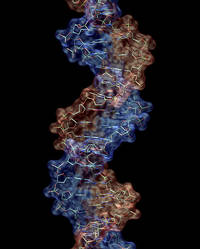 United States District Court Judge Robert W. Sweet has invalidated Myriad Genetics's infamous "breast cancer patent" -- a patent on genetic mutations that cause breast cancer, which Myriad has exercised in the form of a high lab-fee for analysis on samples (Myriad threatens to sue any independent lab that performs the analysis).
United States District Court Judge Robert W. Sweet has invalidated Myriad Genetics's infamous "breast cancer patent" -- a patent on genetic mutations that cause breast cancer, which Myriad has exercised in the form of a high lab-fee for analysis on samples (Myriad threatens to sue any independent lab that performs the analysis). The suit was brought by the ACLU and the Public Patent Foundation, who argued that US Patent and Trademark Office was wrong to grant patents on genes, as these are not patentable subject matter. The judge agreed, saying that gene patents are patents on a "law of nature" and called the isolation of genes and filing patents on them "a lawyer's trick that circumvents the prohibition on the direct patenting of the DNA in our bodies but which, in practice, reaches the same result."
Which sounds to me like a precedent against all patents that rely on isolated genes. Of course, this isn't over: the pharma/biotech stalwarts interviewed in the linked NYT piece are talking appeal, and I'm sure they'll try to go all the way to the Supreme Court.
I think that the problem here is in the untested idea that imparting exclusive rights to the genome will incentivize more research than allowing anyone to build on discoveries in the genome. It's clear that some exclusive rights provide an incentive so some people to do work. But these exclusive rights also scare off people who have good ideas but are worried about being bankrupted by someone who beat them to the patent.
Combined with that is the natural abhorrence many of us feel at the thought that genes might be patented. Genes aren't a good subject for propertization. Your genes aren't even yours -- you didn't create them. Your parents didn't really create them, either. You're your genes' steward, as are we all, and so many of us have a strong intuition that when someone else claims to own something from our genome, they're being ridiculous, or evil, or both.
Myriad Genetics, the company that holds the patents with the University of Utah Research Foundation, asked the court to dismiss the case, claiming that the work of isolating the DNA from the body transforms it and makes it patentable. Such patents, it said, have been granted for decades; the Supreme Court upheld patents on living organisms in 1980. In fact, many in the patent field had predicted the courts would throw out the suit.ACLU Challenges Patents On Breast Cancer Genes: BRCAJudge Sweet, however, ruled that the patents were "improperly granted" because they involved a "law of nature." He said that many critics of gene patents considered the idea that isolating a gene made it patentable "a 'lawyer's trick' that circumvents the prohibition on the direct patenting of the DNA in our bodies but which, in practice, reaches the same result."
The case could have far-reaching implications. About 20 percent of human genes have been patented, and multibillion-dollar industries have been built atop the intellectual property rights that the patents grant.
Judge Invalidates Human Gene Patent
(Thanks, Gimpy!)
(Image: Dna rendering, a Creative Commons Attribution (2.0) image from ynse's photostream)
- What real piracy looks like: biopirate loses patent over century ...
- Grapes with a EULA
- Synthetic Biology: Drew Endy video
- Humanist transhumanism: Citizen Cyborg
- ACLU fights gene patents
- US patent judges aren't actually patent judges -- "catastrophic ...
- Economists call for patent and copyright abolition
- Halliburton tries to patent patent trolling itself
Sent from James' iPhone
No comments:
Post a Comment